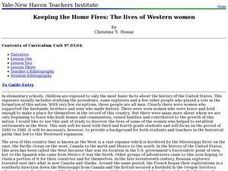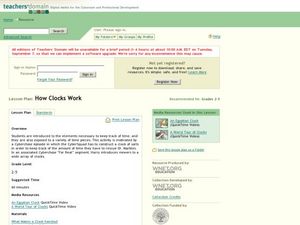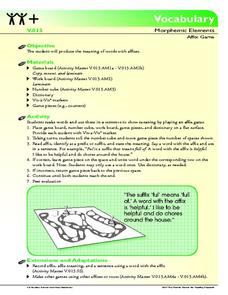Curated OER
Mini-Sanitary Landfill
Second graders work in groups to bury a variety of trash items and arrange them in a mini-landfill. They predict which items will biodegrade and then keep records of what the items look like every ten days. Students consider how...
Curated OER
Keeping Warm?
Fifth graders explore conductors and heat loss in different materials. In this Physical Science lesson plan, 5th graders will be measuring the temperature drop of water in four containers. The class will then discuss what an insulator,...
Curated OER
Keeping the Home Fires: The lives of Western women
Fourth graders explore the various trails that settlers took West from Missouri. They examine the reasons that people took these trails as well as the kind of people who made the journeys. They examine the Oregon, the Mormon, the Santa...
Curated OER
Keeping Soil in Its Place - Slip Slidin' Away
Students experiment to show rain drop splash and splash erosion. For this erosion lesson, students complete 3 experiments showing splash erosion and methods for controlling soil erosion. They complete a number of worksheets, learn...
NASA
Connecting Models and Critical Questions
Scholars use data to analyze and determine which sets of information need to be counted. They create a model to explain differences among chemical elements using graphs to prove concept mastery.
NOAA
Climate Is Our Friend…Isn’t It?: Make an Extinction Polyhedron
Climate affects populations in different ways. Scholars research extinct organisms and mass extinctions in part three of the 10-installment Discover Your Changing World series. They create graphic organizers, then fill in the information...
Curated OER
Doughnuts to $ Database
Fifth graders are selling Krispy Kreme doughnuts to raise money for their overnight camping trip. They use a database to set to keep track of and record additions to their daily sales. Students then follow the step by step directions to...
Curated OER
How Clocks Work
Learners discover time pieces and complete telling time activities. In this time instructional activity, students complete a worksheet about what make a clock keep time. Learners watch a video about time and clocks as well as a video...
Curated OER
Communications: Merit Badge Workbook
If you have a boy scout troop, consider this merit badge workbook to help keep track of communication activities. Boy scouts work with counselors to record communicative interactions. They also complete a series of activities that...
Curated OER
Addition Timed Test
How fast can your learners complete twenty-one addition problems? This worksheet suggests 90 seconds for these single-digit equations. There are two distinct tests, each on a half-page. Learners could do a pre and post-test using this...
Curated OER
Subtraction Timed Test
How quickly can your learners complete 21 subtraction problems? This worksheet suggests 90 seconds for these single-digit equations. There are two distinct tests, each on a half-page. Learners could do a pre and post-test using this...
Curated OER
Counting Cup
Use a counting cup or bag to complete this activity, which has young counters examining the contents of their container. Once they dump it out, they count and record the number either using words, pictures, or numbers. Try a mix of all...
Curated OER
Finding Your Way Using QR Codes
If you are taking your class on a library tour, use this scavenger hunt activity to spice it up. Although this hunt isn't actually attached (like the lesson says it is), you will get a good idea of how to implement a task like this....
Curated OER
Lesson Plan 2: Good Novel, Bad Novel
What are the characteristics of a good piece of writing? What makes a story interesting? Give your pupils a chance to define the qualities of good novels and what they see as the qualities of bad novels. Class members record these...
Freeology
Character Details Organizer
Keeping characters straight, especially in longer, more complex stories, can be a challenge for even the best readers. Here’s a character matrix that can help. Users record the title and author of the piece, as well as a physical...
Michigan State University
Inspecting The School
Keep your eyes peeled for pests! Here, scholars inspect their campus for signs of living things such as insects and rodents. Upon observation, class members record their findings and present the information to their peers.
Curated OER
Irresistible Irregular Verbs
Four fun games for practicing irregular verbs? How fabulous!
BW Walch
Daily Warm-Ups: Grammar and Usage
If grammar practice is anywhere in your curriculum, you must check out an extensive collection of warm-up activities for language arts! Each page focuses on a different concept, from parts of speech to verbals, and provides review...
Smithsonian Institution
POWs
Why did Vietnam POWs and their families receive more media attention than POWs in previous wars? To answer this question, class members view artifacts, read articles, and engage in class discussion. Individuals then assume the voice of...
GoSoftWorks
GoSkyWatch Planetarium for iPad - The Astronomy Star Guide
Digital compass alignment enables navigation of the skies with true orientation at any time. Just point to the sky or "aim for the stars!" This application acts as a virtual telescope, allowing you to zoom in on any object that is...
Baylor College
Measuring and Protecting Skin
Several subjects are addressed within the context of a science lesson plan about the sun's ultraviolet rays. Elementary earth scientists consider protection of the skin with sunscreens (health), estimating and measuring surface area or...
Florida Center for Reading Research
Vocabulary Morphemic Elements: Affix Game
How well do you know your affixes? Find out how proficient your learners are with a game that requires them to define various affixes and use them to create words that will go into sentences.
Curated OER
Weather Journals
Pupils check and record the weather first thing each morning in their weather journals.
Curated OER
Charting the Moon
Sixth graders observe changes in the moon's appearance over a month and keep records of their observations. They write a plan for recording what they see, and a paragraph reflecting on what they have learned over the course of the month.

























